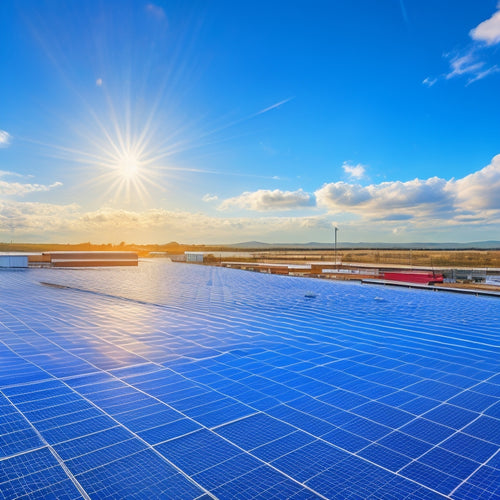
Top Solar Panel Maintenance Contracts
Share
When selecting a top solar panel maintenance contract, you'll want to guarantee it includes energy efficiency enhancements, such as regular monitoring and advanced technologies to detect potential problems. A well-maintained system can increase energy production by up to 15% and extend panel lifespan. Inverter cleaning is also essential, as dirt and debris can reduce energy output by up to 25%. Look for personalized maintenance schedules designed for your system's specific needs, and check the provider's insurance coverage to guarantee adequate protection. By understanding what to look for in a maintenance contract, you'll be able to optimize your solar panel system's performance and unleash its full potential.
At a Glance
- Look for maintenance contracts that prioritize energy efficiency enhancement through regular monitoring and issue resolution to maximize energy production.
- Ensure the contract includes provisions for prolonging panel lifespan through regular cleaning, fault detection, and prompt issue resolution.
- Customized maintenance plans tailored to environmental conditions, panel type, and energy production needs are essential for peak performance.
- Inverter maintenance should be included in the contract, with regular cleaning to prevent energy production losses and ensure optimal performance.
- Review insurance and policy details to ensure adequate coverage, including liability coverage, policy limits, and exclusions.
Boosts Energy Efficiency Fast
You need a rapid energy enhancement to get the most out of your solar panels.
With a maintenance contract, you can maximize power output by ensuring your system operates at ideal levels. By doing so, you'll experience a noticeable increase in energy efficiency, translating to cost savings and a reduced carbon footprint.
This is especially important when considering Renewable Energy Storage solutions, which can help alleviate the burden of high energy bills and reduce grid dependence.
Rapid Energy Boost
Enhancing your solar panel system's energy output is crucial to maximize returns on investment. You need to guarantee your system is running at peak performance to get the most out of your solar technology investment.
With a reliable home battery storage solution, such as the Tesla Powerwall, you can store excess energy generated by your solar panels and apply it during off-peak hours or emergencies. Rapid Energy Boost is a maintenance contract feature that helps you achieve this by identifying and addressing energy efficiency issues quickly.
This feature employs advanced energy innovations to detect potential problems before they affect your energy output. By catching these issues early, you can avoid energy losses and guarantee your system is running at ideal levels.
Rapid Energy Boost also provides you with real-time monitoring and alerts, giving you complete control over your solar panel system's performance.
With Rapid Energy Boost, you can rest assured that your solar panel system is producing energy at its maximum potential. This means more power for your home or business, and more savings on your energy bills.
Maximize Power Output
Nearly 20% of solar panels underperform due to inefficient installation, maintenance, or component failures. When your solar panels don't operate at peak levels, you're losing out on free energy and increasing your reliance on the grid.
To maximize power output, you need a maintenance contract that guarantees your system is running at peak performance. With a reliable electricity supply from Residential Solar Energy storage solutions, you can enjoy uninterrupted power even during outages.
Additionally, a well-maintained solar panel system can increase energy production by up to 15%. This translates to significant savings on your energy bills. By investing in a high-quality maintenance contract, you'll reduce maintenance costs in the long run.
Regular maintenance is essential to enhance energy efficiency fast. A good maintenance contract should include regular inspections, cleaning, and component replacements as needed.
This proactive approach will help identify potential issues before they affect your energy output. By maximizing power output, you'll enjoy greater energy independence and lower your carbon footprint.
Extends Panel Lifespan
As you invest in a solar panel maintenance contract, you'll benefit from regular cleaning schedules that prevent dirt and debris buildup, which can reduce your panel's energy output over time.
By integrating your solar panels with energy storage solutions, you can maximize your renewable energy savings and guarantee a reliable backup power solution.
This proactive approach helps extend your panel's lifespan by minimizing wear and tear.
Additionally, early fault detection through routine inspections guarantees that any issues are addressed promptly, further maximizing your panel's lifespan.
Regular Cleaning Schedules
Your solar panels are a significant investment, and regular cleaning schedules play an essential role in extending their lifespan. Dust, dirt, and debris can reduce your solar panels' efficiency by up to 25%, resulting in lost energy production and revenue.
To prevent this, you should establish a regular cleaning schedule based on your solar panel type and environmental conditions.
For example, if you live in a dusty or polluted area, you may need to clean your solar panels every 2-3 months. In coastal areas, you may need to clean them every 4-6 months to remove salt deposits.
The frequency of cleaning also depends on the type of solar panel you have. Thin-film solar panels, for instance, may require more frequent cleaning than crystalline silicon solar panels.
A well-maintained cleaning schedule can help prevent hotspots, which can lead to premature wear and tear on your solar panels.
Early Fault Detection
Regular cleaning schedules are just one aspect of maintaining your solar panels' peak performance. To guarantee ideal energy production, you need to detect potential issues before they become major problems. This is where early fault detection comes in. By identifying faults early, you can extend your solar panel lifespan and avoid costly repairs.
| Fault Type | Detection Method | Preventative Measure |
|---|---|---|
| Inverter malfunction | Remote monitoring | Regular software updates |
| Panel misalignment | Thermal imaging | Adjust panel angles seasonally |
| Loose connections | Electrical testing | Tighten connections quarterly |
| Soil buildup | Visual inspection | Clean panels every 6 months |
Early fault detection involves using advanced technologies like remote monitoring, thermal imaging, and electrical testing to identify potential issues. By analyzing data from these sources, you can perform predictive maintenance and prevent faults from occurring in the first place. This proactive approach saves you time and money in the long run. By incorporating early fault detection into your maintenance routine, you can guarantee your solar panels continue to generate energy efficiently and effectively.
Inverter Cleaning Is Crucial
You'll want to verify your inverter is free from dust and debris, as these can considerably impede its performance.
In fact, a clean inverter is essential for efficient energy output, and regular cleaning can help maintain peak operation.
By integrating a reliable home battery storage solution and practicing regular maintenance, you can maximize your solar panel system's energy production and overall efficiency.
Dust and Debris Removal
As solar panels operate, they inevitably accumulate dust and debris that can compromise their efficiency. This buildup reduces the amount of sunlight that reaches the photovoltaic cells, leading to decreased energy production.
To mitigate this issue, it's crucial to implement preventive measures, such as regular cleaning schedules. You can take advantage of automated cleaning techniques, like robotic cleaners or sprinkler systems, to minimize manual labor. Additionally, consider incorporating water-conserving methods, like dry cleaning or brush-based systems, to reduce your environmental footprint.
When selecting a maintenance contract, look for providers that offer specialized cleaning techniques customized to your specific solar panel setup. Confirm their methods are gentle on the panels to prevent damage or scratches.
Also, inquire about their debris removal protocols, as some contracts may include disposal services for accumulated waste. By prioritizing dust and debris removal, you can maintain peak energy production and extend the lifespan of your solar panels.
Efficient Energy Output
During the solar panel's energy conversion process, inverters play an important role in maximizing energy output. As you invest in solar panel optimization, it's vital to guarantee your inverters are functioning at their best. Inverter cleaning is a significant aspect of solar panel maintenance contracts, as dirt and debris can reduce energy production by up to 25%.
| Inverter Condition | Energy Production Impact |
|---|---|
| Clean | Ideal energy production |
| Light dust buildup | 5-10% energy loss |
| Moderate dust buildup | 10-15% energy loss |
| Heavy dust buildup | 15-25% energy loss |
| Extreme dust buildup | 25%+ energy loss |
Regular inverter cleaning can prevent these losses, making sure you get the most out of your solar panel system. When selecting a solar panel maintenance contract, look for providers that include inverter cleaning as part of their services. This simple step can make a significant difference in your energy production and overall system performance.
Check Provider's Insurance Coverage
When reviewing a solar panel maintenance contract, you'll want to check that the provider has adequate insurance coverage.
As you shift to a renewable energy system, it's crucial to verify your provider is prepared for any unexpected events, such as power outages or grid backup failures renewable energy systems.
Specifically, you should confirm that their policy includes liability coverage, which protects you in case of accidents or property damage.
Additionally, be certain to ask about the policy limit details to make sure it's sufficient to cover potential losses.
Liability Coverage Included
Before signing a solar panel maintenance contract, scrutinize the provider's insurance coverage to confirm it includes liability protection. You want to ascertain that the provider has adequate insurance to cover any damages or injuries that may occur during maintenance.
When reviewing the contract, look for liability exclusions that may limit the provider's responsibility. Pay attention to contract terms that specify the types of damages or injuries covered. Be wary of clauses that exempt the provider from liability for certain types of incidents.
You should also verify the provider's insurance coverage limits to confirm they're sufficient to cover potential damages. Don't assume that the provider has adequate coverage; instead, ask for proof of insurance and review the policy documents.
Policy Limit Details
Reviewing the policy limit details is essential to understanding the scope of the provider's insurance coverage. You'll want to know the maximum amount the provider's insurance will pay out in case of a claim. This information will help you determine if the coverage is sufficient for your solar panel maintenance needs.
When reviewing policy limit details, you'll typically find two types of limits: per-occurrence and aggregate. The per-occurrence limit is the maximum amount the insurance will pay for a single incident, while the aggregate limit is the total amount the insurance will pay for all incidents within a specific period.
During contract negotiations, it's vital to verify the policy limits are adequate to cover your potential losses. You should also review the service agreements to understand what's covered and what's excluded.
Customized Maintenance Schedules
When you opt for a customized maintenance schedule, you'll have the flexibility to tailor your maintenance program to your solar panel system's specific needs.
This includes scheduling cleaning sessions at ideal intervals to guarantee maximum energy production.
Scheduled Cleaning Sessions
You invest in solar panels to employ renewable energy and reduce your carbon footprint, but dirt and debris can greatly diminish their efficiency. Scheduled cleaning sessions are an essential aspect of customized maintenance schedules, guaranteeing your solar panels operate at peak performance.
Regular cleaning helps remove dirt, dust, and other substances that can block sunlight and hinder energy production.
When it comes to cleaning techniques, you can opt for manual or automated methods. Manual cleaning involves using soft-bristled brushes, deionized water, and mild detergents to remove debris.
Automated cleaning systems, on the other hand, use robotic cleaners that spray water and brushes to clean the panels. The service frequency depends on your location and environmental conditions.
In areas with high levels of pollution or dust, more frequent cleaning may be necessary. Typically, cleaning sessions are scheduled every 6-12 months, but this can vary depending on your specific needs.
Frequently Asked Questions
What Is the Typical Response Time for Maintenance Requests?
When you submit a maintenance request, you typically get a response within 2-4 hours, depending on factors like severity, location, and vendor workload, with emergency response times usually under 1 hour, giving you peace of mind.
Can I Customize My Maintenance Contract to Fit My Needs?
You're not stuck with a one-size-fits-all approach! You can handpick custom maintenance options to create a personalized service agreement that's customized to your unique needs, giving you the flexibility and freedom to optimize your solar panel performance.
Are Maintenance Contracts Transferable to New Owners?
When you sell your property, you're likely wondering if you can transfer your maintenance contract to the new owner, ensuring they reap the maintenance benefits; fortunately, you can, as contract ownership can be easily transferred, providing peace of mind for all parties involved.
How Often Should I Inspect My Solar Panels Myself?
As you bask in the radiant glow of your solar panels, remember to regularly inspect them, performing visual checks every 3-6 months to guarantee peak performance, and more thorough inspections quarterly to detect hidden issues.
Do Maintenance Contracts Cover Panel Replacement Costs?
You'll want to review the fine print: most maintenance contracts don't cover panel replacement costs, which are typically handled by the panel warranty or manufacturer's replacement policy, so be sure to understand these separate agreements to avoid surprise expenses.
Explore More
You've invested in high-quality solar panels, now it's time to protect that investment with a solid maintenance contract. By doing so, you'll not only enhance your energy efficiency in no time, but also extend the lifespan of your panels. Remember, a clean inverter is key, and don't forget to check your provider's insurance coverage. With a customized maintenance schedule, you'll be generating clean energy with confidence. By choosing the right contract, you'll reap the rewards of solar power for years to come.
Related Posts
-

Solar Phone Chargers for Camping Essentials
Solar phone chargers are must-haves for your camping essentials, allowing you to stay connected while enjoying nature...
-

Solar Powered Lights for Sustainable Home Decor
Solar-powered lights offer a stylish and eco-friendly way to enhance your home decor. They capture sunlight, converti...
-

Commercial Solar Energy
As you consider powering your business with commercial solar energy, you'll uncover it offers a triple benefit: signi...


